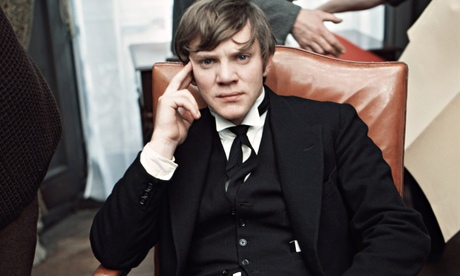
It is every unruly pupil's fantasy to run riot in the classroom and Mick Travis, the anti-hero in Lindsay Anderson's If …, takes schoolboy rebellion to the limit. This razor-sharp satire eviscerates the British establishment, and Malcolm McDowell relishes his role as the public-school refusenik at war with the society that created him. This was McDowell's debut, and his work with Anderson was to be his best. Kubrick's A Clockwork Orange made him a household name, but the rest of his career was spent playing minor-league heavies.
McDowell's roles in Anderson's loose trilogy comprising If …, O Lucky Man! and Britannia Hospital do not trace the development of a single character. Mick Travis is a shape-shifter whose circumstances and attitudes differ according to Anderson's purpose. The disaffected public schoolboy in If … , the innocent chancer in O Lucky Man! and the investigative reporter in Britannia Hospital share the same name but little else. Each is a cipher through which the director projects his conflicted vision of the state of the nation.
You don't have to be an old boy from Eton, Harrow or even Cheltenham College (one of the locations where If … was filmed) to sympathise with Travis's alienated spirit – my own (distant) school days were spent at a Catholic comprehensive in northern England – you just need to share his belief that the game has been rigged so you might as well trash the rules. It's a nihilistic vision that preceded the negative energy of punk by 10 years, but Travis is no Johnny Rotten dancing to a fashionista's tune. The school uniforms at the fictional college are deliberately anachronistic, blending Edwardian jackets and pre-revolutionary Russian headwear. There is no groovy soundtrack to set the movie in a specific time frame and nobody mumbles existential one-liners in the style of Marlon Brando.
The film was released in 1968 when students in the US and Europe were taking their protest to the streets, but it shares none of the soixante-huitards' utopian optimism. McDowell is no student philosopher leading his followers towards a better dawn. His thinking, such as it is, could be based on DH Lawrence's lines: "If you make a revolution, make it for fun …"
Reading on mobile? Click to view.
The mood darkens from poking fun at pomposity to murderous rage. It draws its considerable strength from the fact that many of the absurdist elements of the story have roots in reality. The Lindsay Anderson archive at Stirling University contains the school memorabilia he made use of to create his disturbing characters. Anderson claimed that the nonsense spouted by the headmaster was taken verbatim from a 1967 book called Eton – How It Works.
If the rebels have any cause, it is the Maoist belief that change must come from the barrel of a gun so, goaded by their superiors' idiocy, on school speech day Mick and his cohorts mount a confrontation armed with bazookas. But what are the school kids rebelling against? The bête noire of adolescents through the ages - duty, conformity, the terrifying prospect of growing up and turning into the people you hate. Anderson takes a surrealistic approach to the story, but there is one element that is grimly realistic: the forces of power fight back against the threat to their authority with every weapon in their arsenal. In the end, Mick Travis is no match for the big guns.
Travis stands in a long line of doomed romantic heroes from Beethoven to Russell Brand. The school revolution he leads is bound to fail, but boy is it exhilarating while it lasts. Maturity may bring the realisation that you don't make the world a better place by shooting all your elders, but it is hard not to sympathise with the view of Anderson that British society is a con trick played at the expense of most of the population.
Apparently, David Cameron once nominated this scathing film as one of his favourites. It is of a piece with his similarly odd statement that the Jam's Eton Rifles is a regular on his iPod. No doubt the eternally angry Travis would agree with Paul Weller's question after David Cameron named Eton Rifles as his favourite song in 1998: "Which part of it doesn't he get?". It goes to show that you can kick against the pricks all you like, but turning rebellion into money has always been the prerogative of the powerful.
• Why I'd like to be … Harrison Ford in Raiders of the Lost Ark
• Why I'd like to be … Val Kilmer in Tombstone
• More from the Role model series

